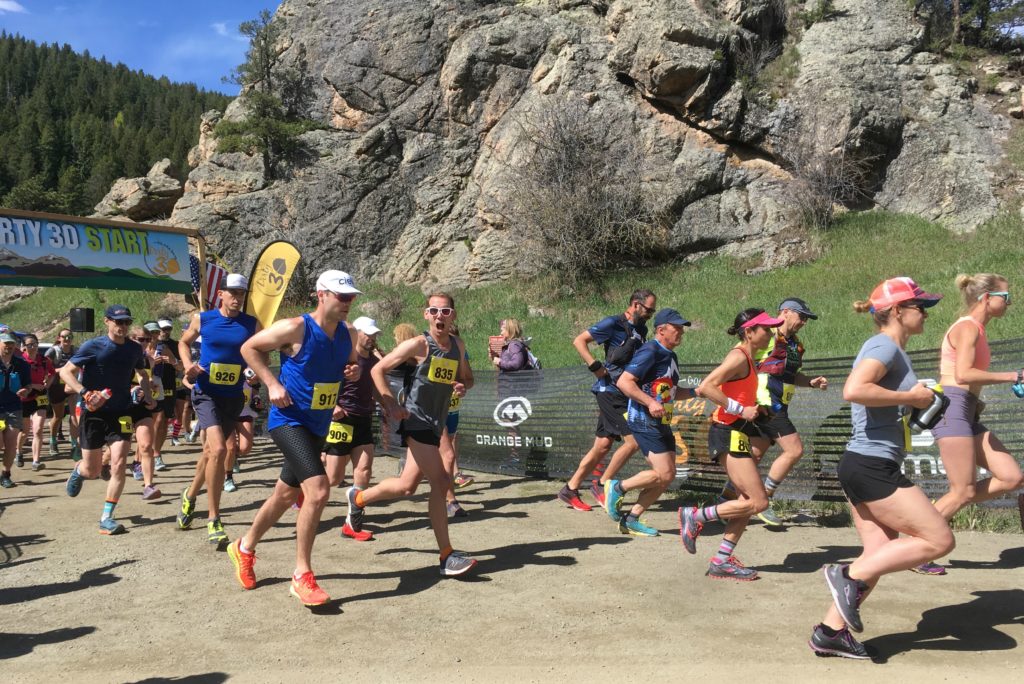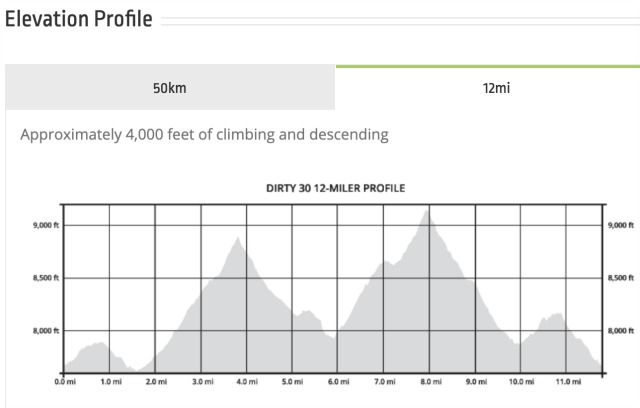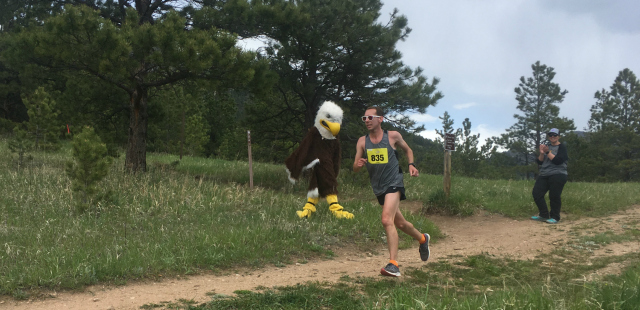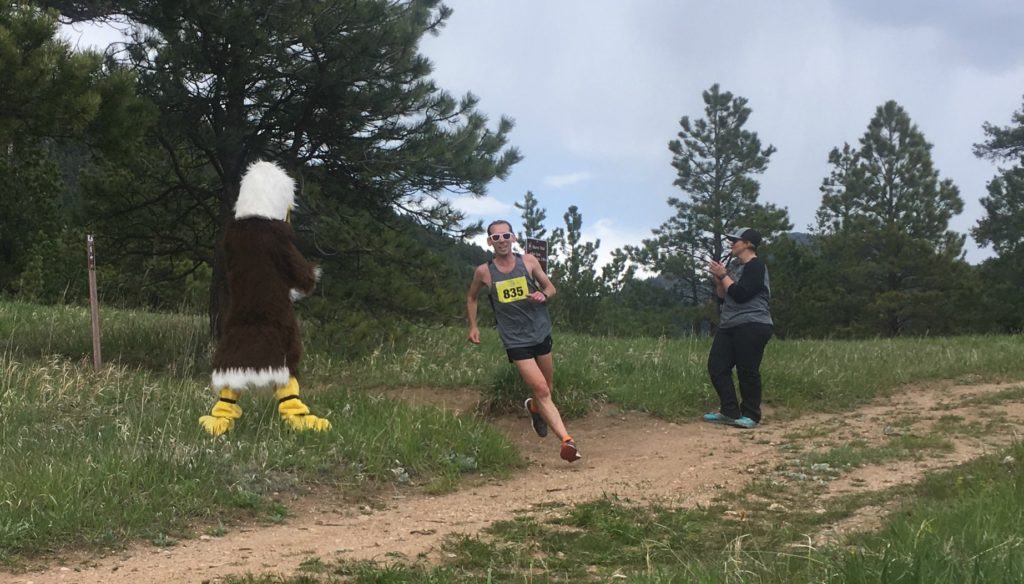On June 1st, I was disqualified from the 2019 Golden Gate Dirty 30 12-mile trail race. It was an absolute blast!

The start of the Dirty 30 12-mile trail race
You see, I cut the course. I would never do this on purpose but alas, this is often the reality when it comes to technical trail races in the mountains.
My Strava data clearly shows me turning around in the middle of an ascent. My memory of that moment is that I reached a rocky clearing in the trail, had no idea where to go, and I thought I found a trail marking.
But, as my wife will tell you, I don’t have a great sense of direction. I made a boneheaded move and got turned around in that little clearing and went down the same way I had come up.
Even though I didn’t get an official time or place (official results are here, noting me at the bottom as ‘DNF’), I’ll accept Dirty 30’s Idiocy Award.
Regardless, the race was a thrill (as most races are) and I’m glad that I ventured out into the mountains to tackle all that vertical.
But what can you learn from being disqualified? It turns out, a lot. I’ve been thinking about my DQ for the last week and I’m ready to share some lessons.
It Doesn’t Always Get Worse
Long races have a way of revealing the chinks in your mental armor. Spend a few hours pushing your body and mind to higher levels of fatigue and you’ll discover your limits.
Such was my experience during this race.
The Dirty 30 12-mile race wasn’t terribly long. But when you see the elevation and altitude map, you’ll understand why I barely cracked 11:00 minutes per mile:

The Dirty 30 Elevation Profile. They’re not messing around.
Any race that has you struggling against your limits for hours will teach you that your psychology plays a large role in performance. And during most of the race, I flip flopped between two competing emotions:
- An unwavering aggression to push uphill, hammer downhill, and take advantage of the terrain to run faster
- Utter defeat and a resignation that just finishing, no matter my effort, is a fine goal
Each emotion washed over me in an awesome wave.
Whenever I felt good, I thought, “This is it! Time to roll and crush this race!”
And when I felt bad, I thought, “Let’s just get through this, you’re washed up so who cares what your time is.”
The conversation that you have with yourself is important and can lead to a healthy relationship with race-related discomfort. And the opposite is certainly true as well.
But stay positive. Long races don’t always get worse. You’ll have waves of negativity but those will probably be followed by periods where you feel great.
You can display extraordinary mental strength by enduring the bad times, not getting too down on yourself, and then taking advantage of the moments when you feel better.
Race for the Right Reasons

If you don’t race in sunglasses, did you really race?
This post has been delayed by a week because I’ve struggled with how to think about this race.
On one hand, I don’t have an official time or place. My race data on Strava is corrupt since I didn’t run the full course. It’s like I never ran the race at all (but still paid for it!).
But on the other hand, I had fun. I spent two hours trail running in the mountains of Colorado, put forth a strong effort, and likely would have still finished 2nd if I had run the entire course.
It’s a question of whether you value the external results like time and place that you get from running or the experience and internal comfort from knowing you did a good job.
And of course, most runners value both!
I don’t have a good answer to this problem. There’s certainly less anxiety without worrying about external results. But then, are you really getting everything out of running if you don’t care about place or time?
Where’s the balance between running for the experience, the fun of it, and the thrill of racing vs. the time, place, and cold hard data?
Perhaps we ought to focus on both but be flexible to weight one more heavily depending on the circumstance.
So if you accidentally get DQ’d in a race like me, it’s a rare occurrence and moving on might be the best option.
Or if you feel terrible in a race and don’t think you pushed yourself, but still ended up running a Personal Best, you can recognize the positive forward momentum and take solace in your results.
I’m not sure that’s the right answer but it’s what I’ve been thinking about for the last few weeks.
I’m curious what you might think – the comments below are open!
Have Fun or Quit

Nearing the 10-mile mark at Dirty 30, all smiles! But what’s up with that eagle…?
I’m fond of saying that I’m not in the business of getting people to love running. I can’t create internal motivation for you.
But if you do love running, then let’s get to work!
So the other Saturday, as I stood near the finish line expressing my dissatisfaction with the race director (I got lost at this exact spot in earlier years too!), I had to remind myself that I just had an absolute blast for the last two hours.
Why was I so upset if I had so much fun? Obviously, the lack of external results.
But this wasn’t going to be any kind of PR (that ain’t happening at 9,000 feet altitude on this terrain!). I wasn’t close to winning nor would a victory even mean much, besides being a boost to my ego.
So I quickly settled on remembering the experience of this race:
- The chuckle I got from answering the question, “What do you need?” from a volunteer with, “A finish line!” (I’m my own biggest fan)
- Hammering a mountain descent with snow-capped peaks in the background, feeling free from everyday constraints
- The positivity and excitement I felt from the volunteers, which made me have an even better time on the trails
- Serenity from running some of the most beautiful trails in the country
- Deep satisfaction from running hard when I was tired, confronting my destructive inner thoughts, and finishing strong
Regardless of getting that big fat DQ next to my name, I loved this race.
I loved seeing other runners get after it, do well, and being able to share in that camaraderie.
To my fellow Dirty 30 racers, I hope you had as much fun as I did. Next time, I’ll try to stay on course 🙂
Resources:
- Trail Running 101 for new runnners
- The Trail Runner’s System (a full course for aspiring trail runners)
- How to find running trails (podcast)